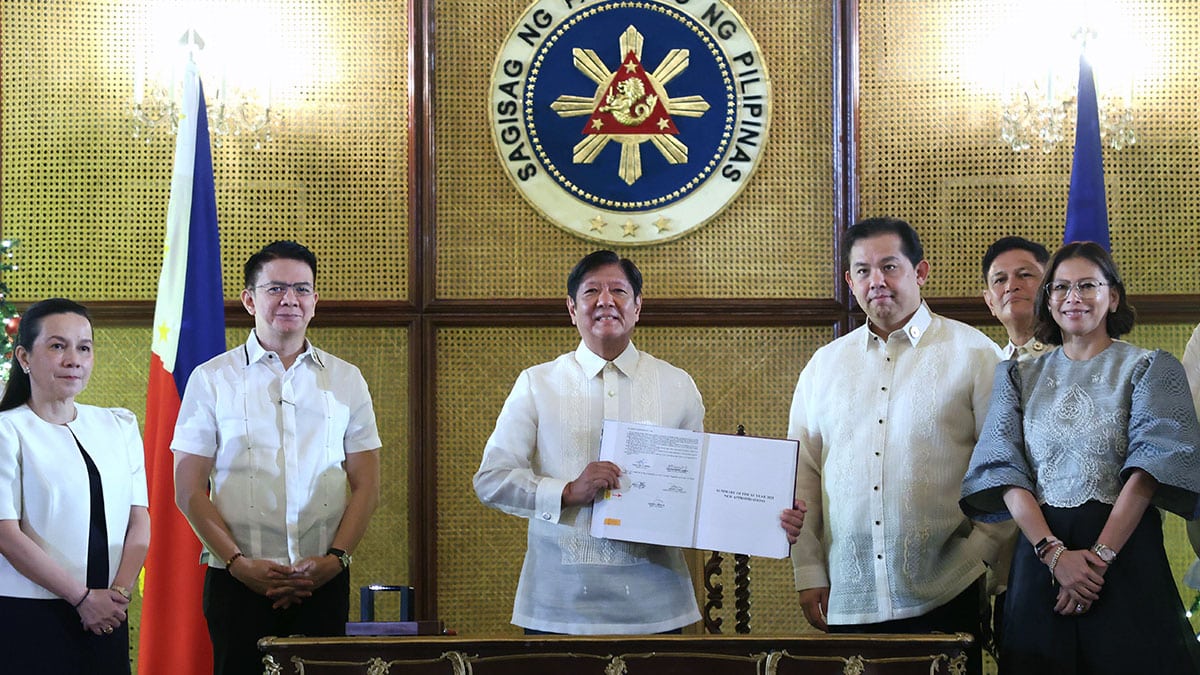Marcos signs P6.3-T budget; items worth P194B vetoed

SPENDING GUIDE President Marcos says the 2025 national budget, which he signed in a ceremony in Malacañang on Monday, underscores the government’s commitment to social services, education and health. —MARIANNE BERMUDEZ
President Marcos on Monday finally signed the P6.326-trillion national budget for 2025 after striking out up to P194 billion in items that he claimed did not respond directly to the people’s needs.
During the signing ceremony in Malacañang, the President said his veto over a number of line items in the proposed measure proved that the executive branch listened to the criticisms against the final version of the 2025 General Appropriations Bill.
The budget was supposed to be signed before Christmas but was postponed to allow for an extensive review of the budget’s provisions following calls of several sectors to scrutinize its particulars.
Of the P194 billion in budget line items that Mr. Marcos decided to veto, P26.065-billion worth of projects were under the Department of Public Works and Highways (DPWH) while P168.240 billion were allocated under “unprogrammed appropriations.”
“To the Filipino people, we listened to you. We thank you for scrutinizing our national budget and for objecting to the difference between the versions submitted by Congress from the proposed funding submitted by the President,” he said in Filipino.
Article continues after this advertisementMr. Marcos issued the statement moments after signing the final version of the 2025 GAB, which he said, “reflects our collective commitment to transforming economic gains into meaningful outcomes for every Filipino.”
Article continues after this advertisement“It is designed not just to address our present needs, but to sustain growth and to uplift the lives of generations that are yet to come,” he said.
More for education
With the reduction in the allocation for the DPWH, Budget Secretary Amenah Pangandaman said the education sector now has the highest allocation with P1.055 trillion.
The funding is spread across the Department of Education (DepEd), Commission on Higher Education, Technical Education and Skills Development Authority, Local Government Academy, Philippine National Police Academy, Philippine Public Safety College, National Defense College of the Philippines, Philippine Military Academy, Philippine Science High School System, Science Education Institute, and state universities and colleges.
The DPWH is left with P1.007 trillion.
According to Finance Secretary Ralph Recto, this is the first time that the education and infrastructure budgets both hit the trillion-peso mark.
“That would augur well for the economy’s growth for 2025,” he said in a Palace press briefing.
Other agencies that got big budget allocations for 2025 are the Department of National Defense with P315.1 billion; Department of the Interior and Local Government, P279.1 billion; Department of Health, P267.8 billion; and Department of Agriculture with P237.4 billion.
The Department of Social Welfare and Development (DSWD) will get P217.5 billion; Department of Transportation, P123.7 billion; judiciary, P64 billion; while the Department of Justice will receive P42.2 billion.
According to Mr. Marcos, the executive branch heeded the concerns raised by many sectors over the final version of the 2025 GAB that, he said, contained provisions that were “not consistent with the country’s development plan and responsive to the needs of the people.”
“The Filipino people have spoken: every centavo must go to programs that truly uplift lives, strengthen communities, secure the future development of the Philippines,” he said.
Public Works Secretary Manuel Bonoan said among the deleted items were projects that were deemed “not ready for implementation,” many of which were local projects.
‘Conditional implementation’
While the President did not veto the controversial allotment of the Ayuda para sa mga Kapos ang Kita (Akap) program of the DSWD, he pushed for its “conditional implementation.”
According to Mr. Marcos, the government will distribute funds from Akap through “convergence efforts” with agencies that include the DSWD, Department of Labor and Employment and the National Economic and Development Authority.
Akap provides cash assistance to minimum wage earners and near-poor Filipinos to help tide them over the effects of inflation.
“This way we ensure that its implementation will be strategic leading to the long-term improvement of the lives of qualified beneficiaries, while guarding against misuse, and duplication, and fragmented benefits,” the President said.
“This approach is anchored on a simple yet profound truth: the appropriation of public funds must not break the public trust,” he added.
Not an option
Mr. Marcos said he turned down calls to veto the entire 2025 GAB and let the government operate under a reenacted 2024 budget as this was supposedly “not an option that (the government) can afford.”
“A reenacted budget will set us back, delay our vital programs, jeopardize targets for economic growth, including our goals of achieving single-digit poverty levels, and upper-middle-income status,” he said.
He did not mention the widely criticized zero-subsidy for the Philippine Health Insurance Corp. and the reduction in the funding for DepEd, but pledged that the government will strive to expand its services according to his administration’s five-year Philippine Development Plan until 2028.
The government will also ensure the implementation of its plans to lower the cost of food items, mainly rice, Mr. Marcos said.
He reminded government workers to “use the people’s funds properly.”
Speaker Martin Romualdez described the President’s signing of the GAB as a “decisive action,” preventing a reenacted budget and ensuring uninterrupted government operations to address the country’s most pressing priorities.
He said the budget “represents the efficient and responsible use of resources, balancing fiscal discipline with the government’s commitment to improving the quality of life for all Filipinos.” —WITH REPORTS FROM JEANNETTE I . ANDRADE AND PNA INQ